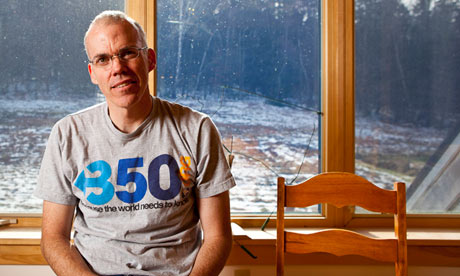Bill McKibben, founder of the grassroots climate campaigning organisation 350.org, has arrived in the UK on the latest leg of his whistlestop six-day European fossil fuel divestment campaign tour. After visiting Berlin, Oslo and Amsterdam, I caught up with McKibben as he arrived in Edinburgh, before he heads off to Birmingham and then onto London.
The divestment campaign is based on the belief that if we are to stay below 2°C of warming, we cannot emit more than 565 gigatons of carbon dioxide in the future. Fossil fuel companies have more than five times that amount in coal, oil and gas reserves.
He believes the campaign is gaining an unstoppable global momentum but recognises that "rogue" fossil fuel companies will only start paying attention when a price is put on carbon. McKibben calls for progressive businesses to take the political initiative on climate change and says investors are finally starting to wake up to the risk of the carbon bubble bursting.
Is there as much enthusiasm for the divestment campaign in Europe as you have seen in America?
We are seeing a similar level of interest in the campaign and there was an Oxford University study that came out this month showing that this is the fastest growing divestment movement in the planet's history. I think this buoyed everybody up and to read the Wall Street Journal with the long piece from Al Gore and the London based investment adviser David Blood reminding people that not only does this make moral sense, it also is a practical imperative for investors to get out from under this carbon bubble before it bursts. It feels to me like there's a lot of momentum.
Do you think this can really become a global movement and where do you see it going next?
Well this is the third continent that we're engaged in. In North America we've got 380 college campuses, we've got big cities like Seattle and San Francisco divesting, big religious denominations.
We were in Australia and New Zealand in June. Already some of their big denominations and Anglican dioceses have divested their pension funds, or are taking a serious hard look. So now Europe.
I don't know what the fourth continent will be but I think that the idea by now is just sort of spreading on its own which is what we need movements to do. Our job is to seed things. Every place we've been around Europe so far, Berlin, Oslo, Amsterdam; there are lots and lots of local people on the ground ready to take this and run with it.
Looking back, were you really expecting the campaign to take off in this way?
It is much quicker than we expected. We'd been looking at the case of the divestment movement around apartheid in South Africa and that was very powerful, but it was slow. It took eight or ten years of campaigning. It may be that people realise that in this case we just don't have eight or ten years to spare. So, people seem to be going to work with a vengeance.
While you have got religious groups, universities and a few cities on board, what will it take to really take the campaign into the mainstream?
I think the most important thing is getting this analysis out into the information blood stream about the fact that most of the carbon in the world has to stay underground. When we started a year ago it was a report from the Carbon Tracker Initiative and a piece that I wrote for Rolling Stone, neither of which were likely to move the world. But the analysis has now spread to the point where the World Bank, the International Energy Agency, the Intergovernmental Panel on Climate Change and just about everybody else has said that we have to leave at least two thirds of the carbon we know about underground. That's telling. That will have an effect.
Do you think that the fossil fuel companies think of you as more than just a flea on their shoulder?
I've got no idea what they think. They haven't been very pressing so far about dealing with reality; they've attempted to deny for a very long time that there was trouble with climate change or that they would have to change their business model to deal with it. So far they've had enough money to pretty much own our political system and keep them from having to change but you know, people are beginning to catch onto their game and we'll see. It's obviously going to be a very hard battle because they have more money than any industry in history.
Are there any conditions under which you would start talking directly to the fossil fuel industry or do you think this is basically a battle from the outside?
I think they'll be more than willing to talk the day after there's a serious price on carbon around the world. That'll be the day that they decide to become energy companies, not fossil fuel companies and then it'll be a great pleasure to talk with them and watch them put their considerable skills to work for the future instead of against it. But that's not going to happen without serious political action and that will only happen when we're able to weaken their power enough to get the policy change we need.
You say they're incredibly powerful, so how are you going to move to the next stage of "politically bankrupting them?"
Well we're in early days yet with this campaign and we'll see. We think it's one front but there will be many others. Every bad project that they come up with people are challenging with increasing effectiveness.
What do you think those other fronts might look like?
I'm not completely sure. I think we'll see how much momentum it gets. I have a feeling that one of the keys will be that it will begin to really affect how investors view these operations. I mean HSBC said in their big study in all of this, if we ever took the two degree target seriously, the valuations of these companies would be cut in half. That's the moment at which change will start to come.
There are a number of progressive businesses that recognise the dangers ahead if we do not change direction. What do you think they should be doing?
Our job isn't so much to bring them on board. If we create the commotion and the space, others will do that work, and you can see it happening already. Ceres coordinated a letter last week from the thirty biggest pension funds in the US to the fossil fuel industry asking them about those valuations and what it meant that they had unburnable carbon in their reserves, so that's starting to happen and it's good news.
I think one of the big problems is that the rest of the business community has left it up to the fossil fuel industry to talk about climate change. And that's crazy because this is clearly a challenge for everyone, on every front.
What we need them to do is get involved in this fight politically and stand up to the fossil fuel industry and just say 'you do not speak for business, not in the least'.
How do you see your tactics developing?
We use all different kinds of tactics. We did the largest civil disobedience action in thirty years about Keystone in the United States and that's great. But you don't want to use the same tool every time or it gets dull. We'll do it when it's appropriate and if we end up sitting-in outside shareholder meetings then that's the way we'll do it, but our goal always is effectiveness.
What have you learnt about the most effective way to communicate your message?
Most important is having things in a concrete form that people can understand. I wrote the first book about all this 25 years ago and I didn't have that understanding in my head that the way to think about it was that we needed to leave these reserves in the ground. Once one sees the numbers then a number of logical conclusions follow.
When you go around and meet people what is their mood? Are people angry? Are they frustrated? Are they excited?
People are excited by anything that seems to offer the possibility for effective action. The problem with climate change always has been and always will be, that it's so big that it seems difficult to see how as individuals we're going to have a major effect. When we can conceive campaigns that allow people to understand how they might actually make a difference then in our experience people are ready to go.
What are your plans from here?
I'm planning to go home and rest for a while. I'm worn out.
Join the community of sustainability professionals and experts. Become a GSB member to get more stories like this direct to your inbox











